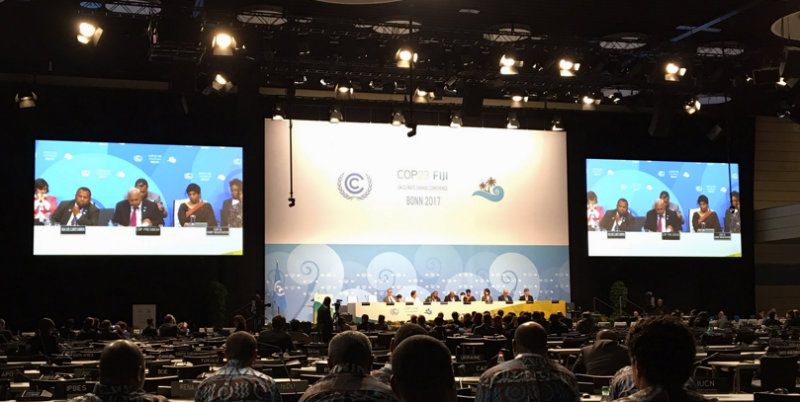SUMMARY
This is AI generated summarization, which may have errors. For context, always refer to the full article.

BONN, Germany – The 23rd UN Climate Change Conference (COP23) wrapped up on Saturday, November 19, at Bonn, Germany. But for the climate groups, the work is far from over.
As the summit came to an end, various civil society organizations recognized the progress in the implementation of the 2015 Paris Agreement but are dismayed with the lack of commitments to loss and damage finance.
Though held in Germany, the “Pacific COP” was hosted by Fiji, underscoring the urgency for action towards the worsening impacts of climate change especially to vulnerable regions such as the Asia-Pacific. (READ: Environmental groups urge PH, ASEAN to join global coal phase-out)
Despite assertions of the Fiji Prime Minister and COP23 President Frank Bainimarama, and other developing states on the need to finance loss and damage on top of mitigation and adaptation funds, the agenda has been sidelined in the negotiations.
The term “loss and damage” was first brought during the Conference of the Parties (COP) 19 in Warsaw, Poland in 2013. It was in the aftermath of Typhoon Yolanda (Haiyan) when then Philippine lead negotiator Naderev “Yeb” Saño brought the idea of loss and damage mechanism for developing countries, defined as the irreversible losses and economics costs (such as loss of life, damaged property and land lost to rising sea levels) incurred from climate-related disasters.
Loss and damage finance
Nithi Nesadurai, Regional Coordinator of Climate Action Network Southeast Asia, echoed the ASEAN statement on COP23 and urged developed countries to commit finance to loss and damage. This appeal fell on deaf ears.
“However, as a region that’s highly vulnerable to climate impacts, we are disappointed to not see this materialize,” he added.
During the negotiations, developed countries like the US, Australia and Canada, as well as the EU, stalled the inclusion of finance in the commitments on loss and damage.
Tracy Carty, Oxfam’s head of delegation at COP 23 stated that there was a disconnect between the conditions of the poorest nations trying to survive disasters worsened by climate change and the financial support that developed countries are willing to offer.
Discussions on loss and damage financing will resume in an expert dialogue under the Warsaw International Mechanism (WIM) on May 2018.
Pre-2020 ambition
Despite what environmental groups called a weak outcome on loss and damage finance, climate groups said that the COP 23 still set the momentum towards the realization of the Paris Agreement.
“COP23 set the momentum to ramp up ambition through the Talanoa dialogue but the best results can be only achieved if deep and meaningful emission reductions take place before 2020, especially by the major industrialized countries,” according to Nesadurai.
The conference resulted in the Talanoa Dialogue, a mechanism wherein countries will take stock on their efforts to curb emissions and assess progress against the Paris Agreement targets throughout 2018.
“The way forward is to ensure climate action at home by pushing for greater nationally determined contributions (NDCs), transitioning away from coal to renewable energy and committing to a low-carbon development pathway within the context of just transition,” he added.
The negotiations also made progress on the implementing guidelines of the Paris Agreement mandating developed countries to “raise ambition,” or disclose and implement drastic emission cuts, starting next year until 2020 and thereafter.
Climate groups from the Philippines – one of the most vulnerable countries to the impacts of climate change – hope to bring these progress home.
“The Fiji Momentum for Implementation highlights the need for drastic climate action now, pre-2020, to lay down the more viable and concrete responses to the graver impacts of climate change to vulnerable communities,” said Marvin Purzuelo, National Coordinator of Aksyon Klima, a network of around 40 NGOs in the Philippines.
“In barely two years, there is a gargantuan task of providing communities and local governments the necessary means so that they will be ready to implement the Paris Agreement by 2020 and beyond,” he added. – Rappler.com
Mickey Miguel-Eva, a Climate Reality Leader, is the Regional Campaigns Communications Officer for Asia with the Climate Action Network, a network of about 1,100 NGOs in over 120 countries. He studied BS Geography at the University of the Philippines – Diliman.
Add a comment
How does this make you feel?
There are no comments yet. Add your comment to start the conversation.